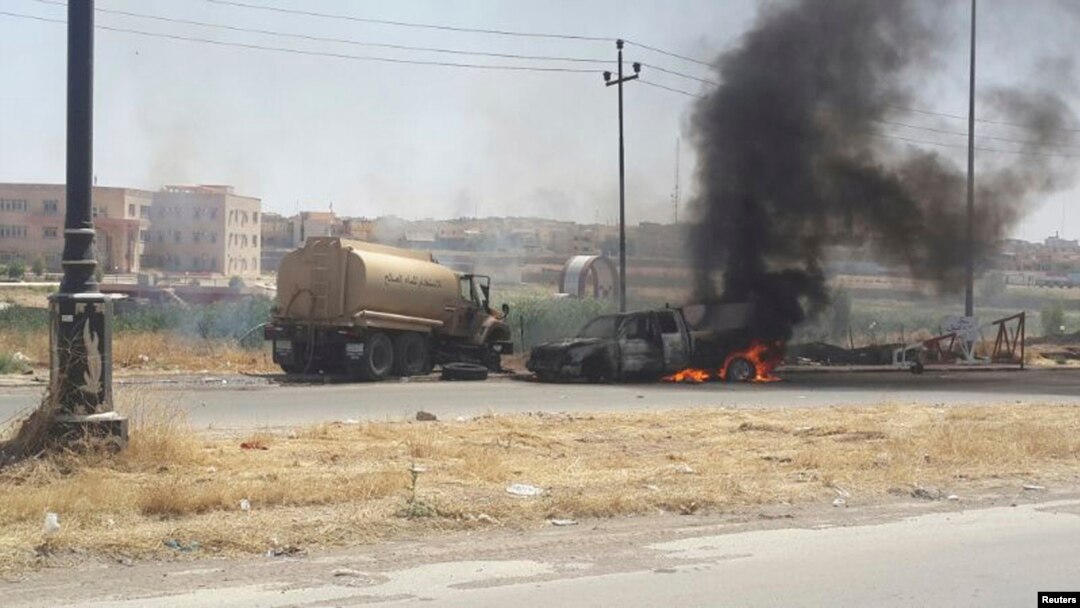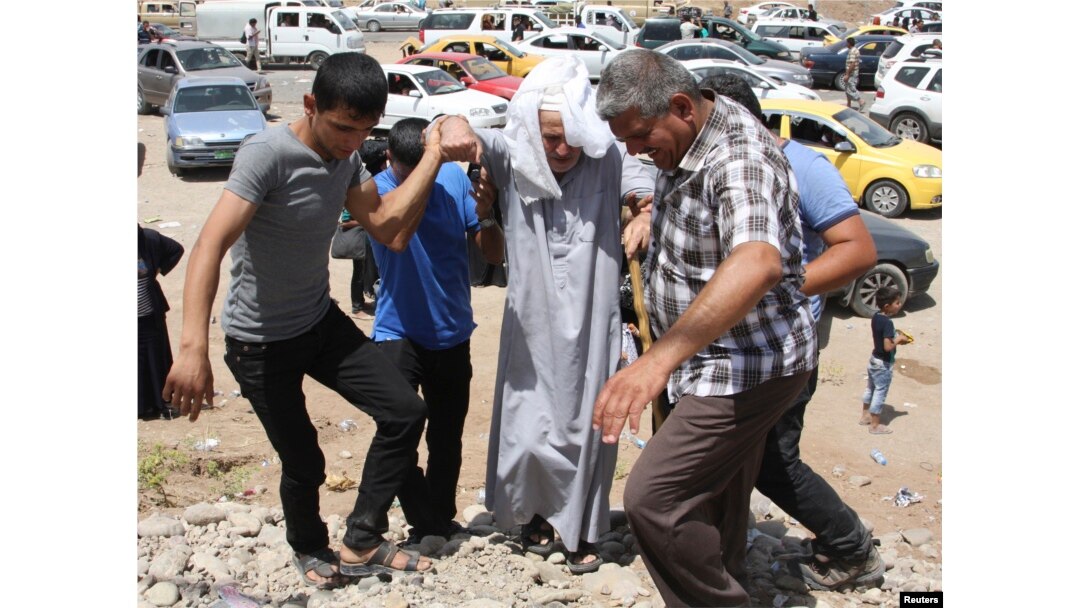CAIRO, EGYPT —
The Iraqi government is calling for parliament to declare a state of emergency, after militants from the al Qaida-affiliated "Islamic State of Iraq and the Levant" seized control of most of the northern city of Mosul and Nineveh Province.
Amateur video showed plumes of black smoke billowing into the air Tuesday over the predominantly Sunni northern Iraqi city of Mosul, after Islamic militants captured police and army positions, setting fire to vehicles. Militants also seized the airport, government offices and banks.
Gunbattles between the militants and the army raged for hours, before the Iraqi military finally withdrew to positions north of the city. Video showed civilian vehicles racing to evacuate Mosul, as truckloads of militants took control of the city's main thoroughfares.
Iraq's Ashirqiya TV reported hundreds of civilians fled Mosul to the northern Kurdish town of Erbil. The TV added that militants from the “Islamic State of Iraq and the Levant” broke into prisons, freeing 2,725 men, many condemned to death or serving life sentences.
Al Arabiya TV said the Iraqi Army fled from its positions inside Mosul, while an Iraqi military spokesman called it a “tactical withdrawal.” A Sunni political analyst told Arabiya TV that Sunnis make up only five percent of the Iraqi Army, making it difficult to control predominantly Sunni Mosul.
Iraqi Prime Minister Nouri al Maliki went on state TV to call on parliament to declare a state of emergency and to urge the international community to come to help deal with the crisis.
He said he was proclaiming a maximum alert and urges parliament to act quickly to impose a state of emergency and mobilization of all forces. He called for the U.N., .Arab League, the European Union and other nations to help Iraq fight terrorists, whom he calls a threat to the entire world.
Sunni Parliament Speaker Osama al Nujeifi, a political adversary of Maliki, accused the Iraqi military of abandoning Mosul, as well as their equipment, weapons and ammunition, to the Islamic militants.
He said that the Mosul governor's office warned army leaders in recent weeks about the presence of armed militants in the region, but they took no preventive measures, so that when the battle came to the city, they laid down their weapons, and fled, leaving everything to the terrorists.
The parliament speaker's brother is the provincial governor of Mosul and surrounding Ninevah Province. Al Arabiya TV reported that Nujeifi met with the U.S. ambassador to discuss the military situation in Mosul.
Analyst James Denselow of the London-based Foreign Policy Center told VOA the sudden crisis in Mosul was the result of months of deterioration in security in Sunni regions of Iraq.
"I think what we are witnessing here is the spillover of the Syrian conflict and the presence of emboldened and empowered radical Islamic groups operating from Anbar Province on both sides of the border with Syria, and the Iraqi elections and the continued failure of Maliki to chart an inclusive process for the Sunni community to make them feel part of the Iraqi state,” he said.
The security crisis in Mosul follows months of conflict with Islamic militants in mostly Sunni Anbar Province. The Iraqi Army has repeatedly attacked and shelled the towns of Ramadi and Falluja, failing for the most part to dislodge the militants.
Meanwhile, Prime Minister Maliki is locked in a struggle with both Sunni and Shi'ite political opponents over formation of a new government.
Amateur video showed plumes of black smoke billowing into the air Tuesday over the predominantly Sunni northern Iraqi city of Mosul, after Islamic militants captured police and army positions, setting fire to vehicles. Militants also seized the airport, government offices and banks.
Gunbattles between the militants and the army raged for hours, before the Iraqi military finally withdrew to positions north of the city. Video showed civilian vehicles racing to evacuate Mosul, as truckloads of militants took control of the city's main thoroughfares.
Iraq's Ashirqiya TV reported hundreds of civilians fled Mosul to the northern Kurdish town of Erbil. The TV added that militants from the “Islamic State of Iraq and the Levant” broke into prisons, freeing 2,725 men, many condemned to death or serving life sentences.
Al Arabiya TV said the Iraqi Army fled from its positions inside Mosul, while an Iraqi military spokesman called it a “tactical withdrawal.” A Sunni political analyst told Arabiya TV that Sunnis make up only five percent of the Iraqi Army, making it difficult to control predominantly Sunni Mosul.
Violence in Mosul, Iraq
Iraqi Prime Minister Nouri al Maliki went on state TV to call on parliament to declare a state of emergency and to urge the international community to come to help deal with the crisis.
He said he was proclaiming a maximum alert and urges parliament to act quickly to impose a state of emergency and mobilization of all forces. He called for the U.N., .Arab League, the European Union and other nations to help Iraq fight terrorists, whom he calls a threat to the entire world.
Sunni Parliament Speaker Osama al Nujeifi, a political adversary of Maliki, accused the Iraqi military of abandoning Mosul, as well as their equipment, weapons and ammunition, to the Islamic militants.
He said that the Mosul governor's office warned army leaders in recent weeks about the presence of armed militants in the region, but they took no preventive measures, so that when the battle came to the city, they laid down their weapons, and fled, leaving everything to the terrorists.
The parliament speaker's brother is the provincial governor of Mosul and surrounding Ninevah Province. Al Arabiya TV reported that Nujeifi met with the U.S. ambassador to discuss the military situation in Mosul.
Analyst James Denselow of the London-based Foreign Policy Center told VOA the sudden crisis in Mosul was the result of months of deterioration in security in Sunni regions of Iraq.
"I think what we are witnessing here is the spillover of the Syrian conflict and the presence of emboldened and empowered radical Islamic groups operating from Anbar Province on both sides of the border with Syria, and the Iraqi elections and the continued failure of Maliki to chart an inclusive process for the Sunni community to make them feel part of the Iraqi state,” he said.
The security crisis in Mosul follows months of conflict with Islamic militants in mostly Sunni Anbar Province. The Iraqi Army has repeatedly attacked and shelled the towns of Ramadi and Falluja, failing for the most part to dislodge the militants.
Meanwhile, Prime Minister Maliki is locked in a struggle with both Sunni and Shi'ite political opponents over formation of a new government.



